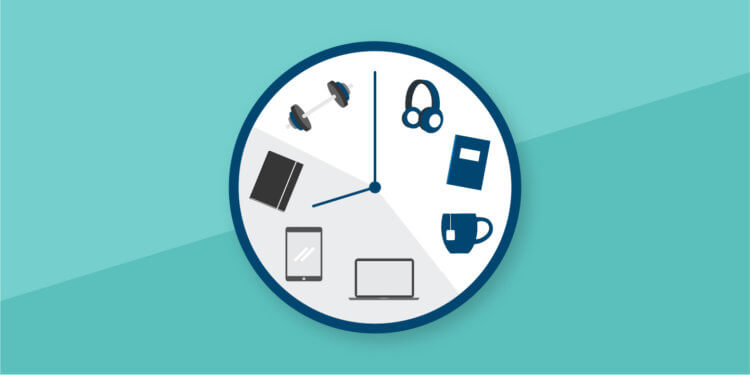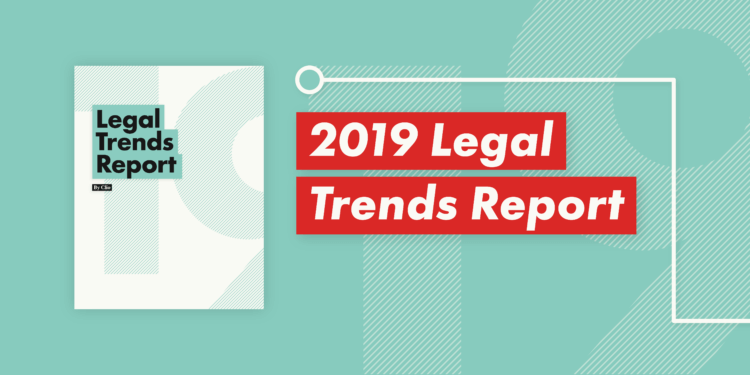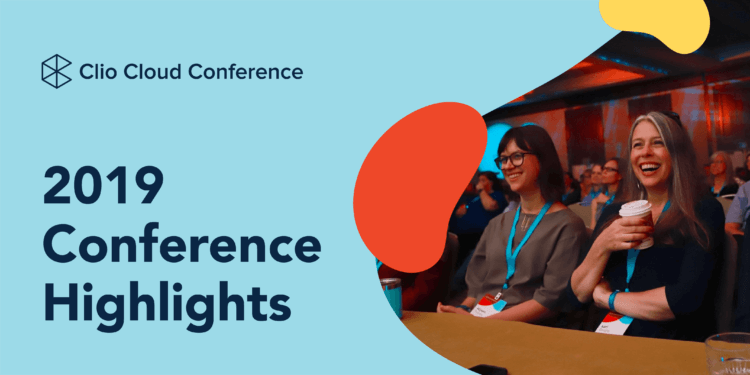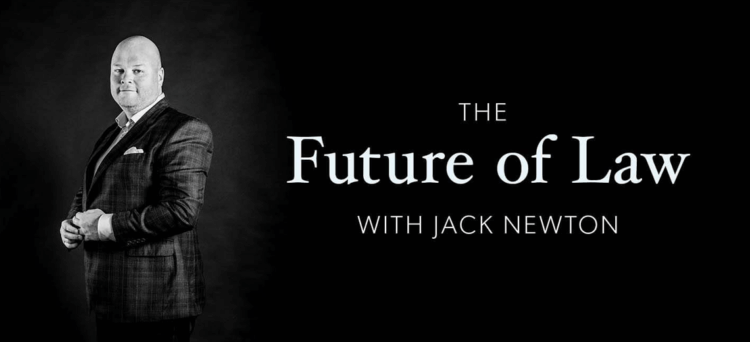How Paralegals Can Lead Innovation
We often talk about how lawyers can better use technology, but what about paralegals? How can paralegals use an innovative approach to get more out of their day and do more of the work they love?
At the 2019 Clio Cloud Conference, we spoke with Lori Gonzales, head of the RayNa Corporation, which helps law firms run more efficiently by taking administrative work off of their plates. Lori is a well-known leader in the legal industry, and had plenty of knowledge to share to help firms.
Teresa:
So what inspired this love of technology, efficiency, and administrative work?
Lori:
I grew up in the legal field, so small and solo firms were my jam for about 15 years, and I worked in some really interesting small firms doing really interesting, different work. So I spent a lot of time doing trial exhibits of 10,000 pages really badly, like really old-school and realized technology had a lot of solutions we just weren’t putting into place. So I think it was a necessity maybe.
Teresa:
And when did you decide to start your own business because of that?
Lori:
About six years ago I actually got laid off from a firm I loved. I thought I would just be the snarky old paralegal in the corner for the rest of my life and when I got laid off, I was pretty devastated by that—and then I realized I could still serve the field in maybe a really new and exciting way. So I decided to try legal billing, and then we’ve just grown into something crazy since then.
Teresa:
How common is this type of business in the legal industry?
Lori:
So I think that we’re legal tech consultants, and I think that you’re certainly seeing a lot more of those now. We also do some really specific admin work. So legal billing is … we actually stopped doing that this year. The majority of that work, it’s a terrible business model. Pretty hard for everybody involved, and there’s actually some great technology that solves these problems. Clio’s part of that.
So that business, it’s not very common for probably a good reason. We’ve recently been working on medical record retrieval, and again, it’s not that common. High-volume admin work is a funny mistress.
Teresa:
Yeah, that certainly makes sense. But again, so there’s not just like this inspirational love of technology, but you’re passionate about the difference that it can make for law firms. So …
Lori:
Yes. So the real reason RayNa Corp. was started was to help lawyers find lost time. Working in law firms, I woke up in the middle of the night worried and stressing about all the things we hadn’t accomplished. I worked 70 or 80 hours a week, and I did not work harder than the lawyers I worked for. That was a really overwhelming, burdensome place to be. And the lawyers that I worked with were … they lived and breathed that every day. And I just knew six years ago—and I’m even more convinced today—that there are better ways for our lawyers who we love to really serve their communities without killing themselves in the process.

Teresa:
Yeah, that sounds good for everyone.
Lori:
Yes. Yes.
Teresa:
So is there a story from a firm that you’ve helped with your work that really sticks with you?
Lori:
So, like all my lawyer friends, I have two stories, I don’t just have one, right? My favorite is my first client. So the first client I ever took on, we really only put in a routine billing process for him. We didn’t do anything fancy. He was already a Clio user. We just helped him use it better and gave him a routine for his firm, and we increased his collected revenue 260% in less than six months. So that’s kind of a crazy number and people always give me the weird eye. But it was that simple. We just mailed his bills for him every month. That’s what we did. That kind of level of process and procedures that were missing in a lot of small and solo firms, because we’re so overwhelmed, is how we can make tons of improvements without some sort of game-changing thing that causes such disruption.
We did the same thing on the medical records side. It’s been fun. I do an experiment every time we want to try something new. So we took a very high-volume personal injury firm in Tennessee. Their average receipt time for medical records when they sent out requests and got them in was 98 days. In less than a year, they doubled their caseload and we took their average receipt time down to 21 days or less. Which has helped them settle cases a month-and-a-half faster, which is big dollars in the personal injury world.
Teresa:
Wow. So with all of those processes, I have to ask: You must not be super surprised to hear the findings from the Legal Trends Report every year.
Lori:
I feel like every year the Legal Trends Report comes out and I go, “Oh yeah, I’m still a genius.” But you know, that’s a little … it is something we see. And the truth is, every law firm knows these numbers. It’s not that I’m a genius. Everyone’s a genius in this field. They know this is happening. They just don’t always know how to solve it. I think. So I’m never surprised by the Legal Trends Report, and in fact I’m excited that we can start using real data to build better solutions.

Teresa:
What were your thoughts on the 2019 report?
Lori:
I’m really excited to hear that we’re talking about how to help law firms scale. I’m actually very upset about this idea of client services, how we’re not doing so well with getting … client facing. I think this is something we talk about in a lot of my circles, not just the legal tech side, but lots of access to the justice side, all of those things. And how the opportunities are just endless for me for a lawyer.
So I’m really excited to see how I haven’t dug fully into the Legal Trends Report. I’m so nerding out about that, and I’m just really excited to see how Clio’s data is going to help law firms move into that next scale. And I think we’ll use it too. We’re Clio users too. So we’re going to use it too.
Teresa:
And why is the work that paralegals and administrative assistants and all the other people who work in a firm and support lawyers do so important when it comes to these things?
Lori:
So I’m super passionate about this in so many ways. I think number one, we forget that admins and paralegals are absolutely the place all legal work starts. Nothing happens until that first document is opened. And that’s usually done by an admin, not a lawyer. But more importantly, admins and paralegals I think spend the most time with clients.
Lawyers come in for the heavy-hitting. But really it’s those front-facing admin and root paralegals who are client-facing and who the clients get to know and trust. And I think that we’re missing an opportunity to really empower them to give us better client-facing services because we overwhelm them with so many inefficient processes and procedures.
Teresa:
So what would a better world look like to you?
Lori:
Actually investing and truly involving admins and paralegals in the decision-making process for implementing technology and new business models. I think they have their finger on what is happening in these firms in a way that is often overlooked. And I’ll also share that I think that, in the best world, we stop insisting that our paralegals also be our bookkeepers and our billers and our accountants and our marketing directors and our operations managers and every other title. The running joke in my paralegal circles is that if you’re a really good paralegal, you actually have 14 jobs and you can go do whatever you want.
That has certainly been the experience of many of the entrepreneur paralegals I find. And I’d really love for law firms to get the true value of those differing skills from people who are trained to do those and let paralegals and admin shine in what they were trained to do.
Teresa:
Absolutely. And why do you think there’s a barrier specifically to the involvement in decision-making processes and things like that?
Lori:
Well, traditionally, when we speak about the legal industry, it’s lawyers. One of my favorite statements from my session yesterday was I’m not a non-anything, especially a non-lawyer. We have lumped lawyers and non-lawyers into two categories, and we think of only lawyers as we start thinking through how to change the industry. The reality is I think we have to stop thinking in terms of those two groups and really approach all of this from the industry.
There are so many people already in the legal industry. We just need to start involving those people at every level and start valuing the services they provide and not lumping all the value together into the non-lawyer category.

Teresa:
Absolutely. Okay. And talking about making things more efficient so that paralegals and legal administrative assistants can focus better on client service. What are some of the top tech hacks for paralegals that you’ve discovered over the years?
Lori:
The best tech hack in the world is just simple curiosity. Just simply try it, try lots of things. I think that it’s very hard sometimes to enjoy trying new tech when you’re overwhelmed, but if you’re genuinely curious about what the world could look like with more time and you approach tech that way, you’ll find so many great products you never knew were possible and you’ll enjoy every minute of that.
Teresa:
What’s been your most surprising product or thing that you’ve ever discovered that way?
Lori:
Oh gosh. That’s like asking me who my favorite child is. There are so many products I love. My journey as an entrepreneur started with Clio. I taught practice management software, the legacy softwares for years, and moonlighted doing lots of things in practice management software. For me, Clio’s journey of how to love lawyers and build an awesome product for them was really powerful and remains that way. But my favorite tool for the office has been CaseMail. It’s an online digital mailing service. I actually met the founder at a Clio conference five years ago, and it does for physical mailing what eFax did for physical faxing. It’s a fantastic product. And, as someone who mails out hundreds of letters every week, we love not having to lick envelopes at our office.
Teresa:
That sounds perfect. I mean, who likes to lick envelopes?
Lori:
That’s right.
Teresa:
So on the flip side, what is something that law firms, whether that’s lawyers or paralegals or administrative assistants or anybody else, what’s something that people do that they think makes them more efficient, but that actually hurts them?
Lori:
So there are so many answers to this, but I think if I’m having to think about this very quickly: Implementing a piece of new technology without fully understanding what problem they think it’s going to solve. I run into so many places where I just bought this new thing and it’s going to change our firm forever. And the problem was not how the paralegal or admin or even the lawyer was utilizing the tech they already had for that, but maybe it was, their computer is 14 years old and it doesn’t like any of the software, right?
Like, it’s often maybe someone’s stuck in a corner with no light, and they’re just dying slow deaths. There are lots of non-tech answers to problems, and when they just simply implement a piece of tech without fully mapping out their problems, I think they feel like “I’m efficient now,” and then realize they’re not.
Teresa:
And what are the most efficient firms that you’ve worked with do differently?
Lori:
Never stop asking the question, “How can I be more efficient?”? It is a lifestyle choice. It is a every day, every week, every month part of your firm and the minute you stop asking the question, I think you lose any momentum you have to be truly successful.

Teresa:
Okay. That makes a lot of sense, especially with your comment on curiosity earlier. But to dig a little deeper, what are the characteristics of a really efficient and successful profitable law firm?
Lori:
I think those firms that are really embodying the idea of the business of law and not just the practice of law. Law, for a very long time, has been this profession or practice where we simply provide really skilled knowledge. And we’ve spent very little time—it feels like, especially in the small and solo area where I live—thinking through the business side, worrying about how an operation works, figuring out how to make an operation work better, looking at each level of the operations, and finding ways to support each of those levels. So I think when I say never stop thinking about efficiency, I really mean never stop thinking about ways to improve the different pieces of the firm and not really just about “How do I become a better lawyer?”
Teresa:
And what advice do you have for maybe paralegals who work at a firm that’s really change averse? They’re listening to you, they’ve heard this stuff, they want to implement change and be more efficient but … I had a lawyer friend once say to me that if it takes them longer than 15 minutes to learn, that’s too long. And they’re just going to continue doing it the old way. So how do you overcome that?
Lori:
So, wow. Can we talk about world hunger instead? Let me think on that one a little bit. I think that’s a really tough question and I think I get that question a lot. I think if you’re really in that situation, spend a little time researching change management, I think that’s important. Understand the principles of change management and be willing to continue to have those conversations with lawyers and, when in doubt, just simply make it their idea.
Any good paralegal knows how to do that. I’m pretty confident we do that a lot. So I think it’s all about helping them slowly but regularly get enough information about why the change is necessary, and that finally leads them to the place they need to be. And so it depends on the trust level, it depends on the relationship, but ultimately keep chipping away until you get there. Don’t give up.
Teresa:
Very encouraging. And do you do much change management work at all and help with this kind of thing?
Lori:
I think that my friends and colleagues and mentors in this space would call me a change management agent. So I am doing a ton of crazy things including trying to change the ethics rules right now in California on things like who can provide legal services and how you partner with people who don’t have a law license.
I think it’s about positivity as well. It’s easy to look at the industry and think about all the negatives and use those as a fear factor to help make change. But I think people only change when they’re encouraged and inspired, and not necessarily when they’re in so much pain and so fearful that they don’t get a better shot. So I think that kind of change happens, but it’s not longstanding and it’s quick and dirty and doesn’t stand for long.
Teresa:
Yeah. What are a few key change management principles that you can share for people?
Lori:
Well, I’m not a fancy talker y’all. One of the things that I find interesting is I do a lot of speaking and a lot of presentations and often I sound a little different than everyone else, because I’m not afraid to ask the really dumb questions and I’m not afraid to just talk from the place that I’m comfortable. And I think there’s fear when you have something to share with lawyers who have so many fancy words, right? Like we have to know all these fancy words.
You feel like you need to match that same energy level in your communication. But communication is just about clear and easy language for me. And so if you really want someone to think about a change, I think you have to connect to them on a personal level and then make sure your communications are clear and authentic. And that doesn’t mean here to [inaudible] telling them things that sound weird coming out of your mouth. So I’m not a fancy word user. I think that’s important. And again, just keep having the conversations.
Teresa:
Absolutely. I think it’s okay if you’re not a fancy word user.
Lori:
I’m really glad.
Teresa:
Thank you so much. Is there anything else you wanted to add?
Lori:
I think I’m going to do the whole weird gratitude thing now, because I think that’s part of this journey as well. I really did start my journey as an entrepreneur in this field at a Clio conference six years ago. I met one of my favorite people ever, who was a speaker that year, who’s been a mentor in this space throughout this journey. And I think finding a community like Clio and what this community of people are doing for the industry is how we stay inspired when we’re totally overwhelmed by the constant need for change. So I just want to encourage everybody: Find the community and be a part of it. It’s an amazing place to be and it’s so easy to get into.
Teresa:
Amazing. Thank you so much for joining me.
Lori:
Thank you, Teresa.
We published this blog post in July 2020. Last updated: .
Categorized in: Technology
How to Drive Change at Your Mid-Sized Firm
Get strategies from industry leaders to shift mindsets, overcome resistance, and secure buy-in through strategic leadership and tailored solutions for mid-sized law firms.
Watch on-demand





